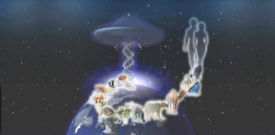 I just finished reading a rather weak and unconvincing critique of SETI by Peter Schenkel over at the Skeptical Inquiry site. It contains the usual errors: an over emphasis on the Rare Earth Hypothesis, far too many sociological considerations that couldn’t possibly be exclusive to all intelligent life, and no thought given to the existential mode of postbiological intelligences (including the presence of megaprojects, both structural and computational).
I just finished reading a rather weak and unconvincing critique of SETI by Peter Schenkel over at the Skeptical Inquiry site. It contains the usual errors: an over emphasis on the Rare Earth Hypothesis, far too many sociological considerations that couldn’t possibly be exclusive to all intelligent life, and no thought given to the existential mode of postbiological intelligences (including the presence of megaprojects, both structural and computational). Anyway, Schenkel made a comment that got me thinking about SETI and what contact means from the perspective of human desires. He noted that,
I would be the first one to react to such a contact event with great delight and satisfaction. The knowledge that we are not alone in the vast realm of the cosmos, and that it will be possible to establish a fruitful dialogue with other, possibly more advanced intelligent beings would mark the biggest event in human history. It would open the door to fantastic perspectives.This is a sentiment that I believe is commonly shared among the contact optimists and those often think about the SETI endeavor. Contact, it is largely assumed, would have a paradigmatic effect on human civilization. Over the years I've heard these sorts of comments: Humans would be humbled and brought together in a state of pan-universal loving kindness. Religions and sectarianism would become irrelevant overnight. We would be able to acquire radically advanced technologies and transform our civilization and species. Humans would have the opportunity to adopt ETI values and social institutions that would undoubtedly be superior to our own.
In other words, we want to be uplifted.
 Science fiction has addressed this issue a number of times (of course). In the classic 50’s film The Day the Earth Stood Still, audiences, who were still shell-shocked from WWII and coming to grips with the presence of apocalyptic technologies, watched as extraterrestrials came down from the heavens and set things straight (talk about wish fulfillment). Essentially, ETI’s established a robotic police presence on Earth to keep potentially combative nation-states in line.
Science fiction has addressed this issue a number of times (of course). In the classic 50’s film The Day the Earth Stood Still, audiences, who were still shell-shocked from WWII and coming to grips with the presence of apocalyptic technologies, watched as extraterrestrials came down from the heavens and set things straight (talk about wish fulfillment). Essentially, ETI’s established a robotic police presence on Earth to keep potentially combative nation-states in line. Similar themes are explored in ET: The Extra Terrestrial, Starman and K-PAX in which enlightened aliens exposed the backwardness and maliciousness of humanity. They may have not set us straight in these movies, but they caused us to be introspective at the very least.
And in David Brin’s Uplift series, an advanced species of extraterrestrials make it their business to traverse the Galaxy uplifting sentient creatures of all sorts, bringing them into a more advanced and dignified state of being. The same sort of thing is explored in Arthur C. Clarke’s 2001 in which an advanced intelligence instigates the rapid makeover of humanity as illustrated by David Bowman’s transformation into the Star Child.
 Some socio-cultural groups have converted these sorts of ideas into religious-like expectations. The most prominent of these are the Raelians, who not only believe that human life was spawned by advanced ETI’s, but that they will eventually return to save humanity and bring eternal life. This is essentially a messianic-style religion that has taken root in the 21st century, and it reveals some very interesting aspects about human nature and religiosity as it manifests in culture. I could say more about UFOlogists, but perhaps I’ll save that rant for another post.
Some socio-cultural groups have converted these sorts of ideas into religious-like expectations. The most prominent of these are the Raelians, who not only believe that human life was spawned by advanced ETI’s, but that they will eventually return to save humanity and bring eternal life. This is essentially a messianic-style religion that has taken root in the 21st century, and it reveals some very interesting aspects about human nature and religiosity as it manifests in culture. I could say more about UFOlogists, but perhaps I’ll save that rant for another post. These examples, both science fictional and social, are representative of the human desire for both cultural and biological uplift. It’s generally assumed that because we can’t fix ourselves that ETI’s will do it for us. Moreover, with ETI’s and their radically advanced technology and enlightened natures, the potential for extreme existential transformation is non-trivial to say the least.
Which leads to the final point I’d like to make, and that’s in regards to the issue of animal uplift. I have to wonder, if there is such a thing as the human desire to be uplifted, why would we assume that nonhumans wouldn’t also desire to be uplifted?
Or are humans the only exalted species who deserve this honor? If and when the ETI’s come, will we tell them to ignore nonhumans? I wonder how the ETI’s would react to that. Perhaps they’ll leave humans alone and uplift their dolphin friends just to spite us over our stupidity.
Thanks for all the fish, you speciesist morons!

No comments:
Post a Comment